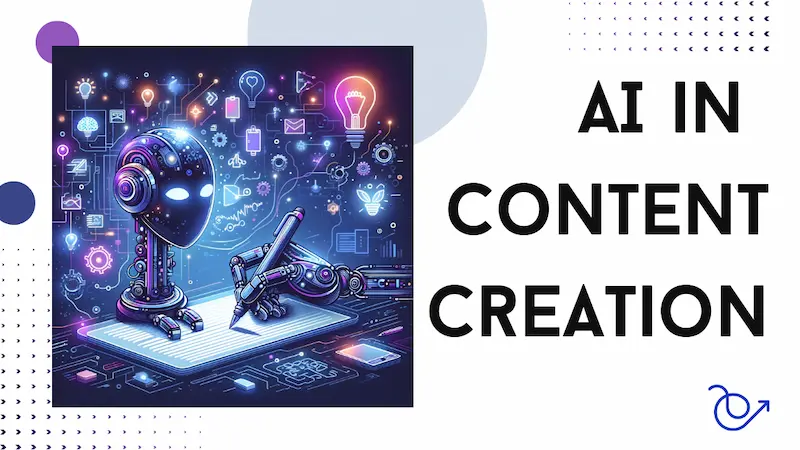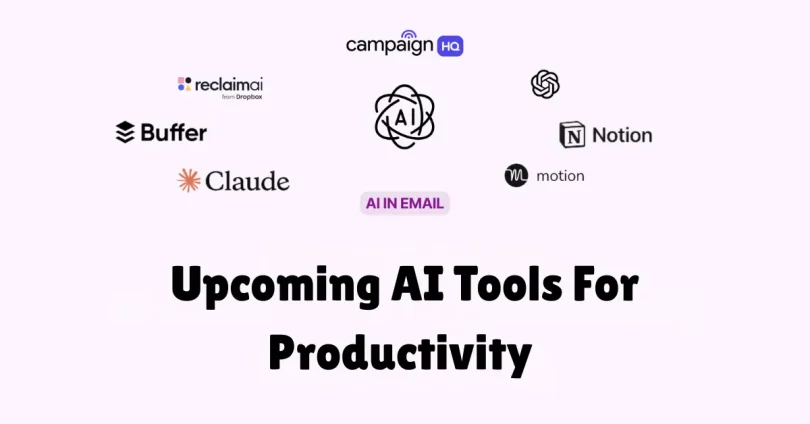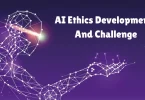Artificial intelligence isn’t science fiction anymore—it’s already part of our daily lives. From spam filters in your inbox to apps that summarize long meetings, AI quietly helps us save time and make better decisions.
As we move into 2025, a new wave of upcoming AI tools for productivity is set to take things even further. These tools won’t just automate tasks—they’ll help you stay creative, organized, and efficient.
Whether you’re a professional balancing meetings, a student managing assignments, or a freelancer juggling clients, the right AI tool can transform how you work. This guide highlights the upcoming AI tools of 2025 and how they can simplify both your personal and professional life.
Why AI Productivity Tools Are a Big Deal

Productivity isn’t about working longer hours, it’s about working better. The real strength of AI lies in its ability to:
- Save time by automating repetitive tasks like data entry, scheduling, or drafting emails.
- Boost focus by filtering out distractions and prioritizing important work.
- Enhance teamwork with smart collaboration and communication features.
- Drive better decision-making through real-time data analysis and predictive insights.
In simple terms, AI acts like a co-pilot—taking over routine tasks so you can focus on high-value work such as strategy, problem-solving, and creativity.
1. AI-Powered Virtual Work Assistants
Traditional digital assistants were limited to setting reminders or checking the weather. The upcoming generation of AI-powered work assistants will be smarter, proactive, and context-aware.
What They Can Do:
- Join virtual meetings, transcribe conversations, and create action-item summaries.
- Sort through inboxes, flag priority emails, and even draft professional replies.
- Suggest optimal meeting times by analyzing team availability and productivity patterns.
- Anticipate needs, such as preparing reports or generating task reminders automatically.
Example:
Imagine starting your day with an AI assistant that has already created a prioritized to-do list, summarized your last meeting, and scheduled focus hours on your calendar.
You may also like to read this:
Top 15 Latest Green Technology Innovations To Watch Now
Top 8 Blockchain Applications Beyond Cryptocurrency Today
Future Applications of Quantum Computing Explained Guide
How The Impact of 5G on Gadgets Is Changing Technology
2. Smart Collaboration Platforms
Hybrid and remote work often make collaboration difficult. AI-driven collaboration platforms are evolving to remove friction and make teamwork more efficient.
Features to Expect:
- Real-time translation for teams working across different languages.
- AI-powered idea generation during brainstorming sessions.
- Automatic project timelines and task assignments based on meeting discussions.
- Smart integrations with existing tools like Microsoft Teams, Slack, or Notion.
These features ensure smoother communication, fewer missed deadlines, and more productive collaboration across teams.
3. AI Writing and Content Creation Tools

Content—whether it’s reports, blog posts, or presentations—takes time to produce. The new generation of AI writing and content tools will make this process faster and more polished.
Capabilities:
- Generate reports or research summaries within minutes.
- Draft blog articles, marketing campaigns, or professional emails.
- Rephrase, edit, and adjust tone to match the audience.
- Create complementary visuals, infographics, or slide decks.
Instead of spending hours writing from scratch, these tools can give you a well-structured first draft that you can refine.
4. Predictive Analytics and Decision-Making Tools
Data is essential for business growth, but it can be overwhelming to interpret. AI-powered analytics platforms will transform raw data into clear, actionable insights.
What’s Coming:
- Identifying business trends before they happen.
- Accurate sales forecasts, customer behavior predictions, and market analysis.
- Automated dashboards that provide real-time insights without manual effort.
These tools allow businesses to make confident, data-driven decisions instead of relying on guesswork.
5. AI for Personal Productivity
AI is not just transforming business—it is also reshaping personal productivity tools.
Features to Look For:
- Apps that track focus levels and suggest when to take breaks or do deep work.
- Personalized learning assistants for professional growth or academics.
- Household AI planners that handle grocery lists, budgeting, and task management.
- Tools designed to support work-life balance by reminding users to rest or exercise.
Such tools make daily life easier and prevent burnout by ensuring a healthier, more balanced routine.
6. Industry-Specific AI Productivity Tools
A major trend in 2025 is the rise of specialized AI tools built for specific industries.
- Healthcare: AI assistants that generate medical reports and assist in faster diagnoses.
- Education: Personalized AI tutors that adapt to different learning styles.
- Finance: AI-powered financial trackers that detect fraud and offer smart investment advice.
- Marketing: Platforms that analyze consumer behavior and automatically optimize campaigns.
These industry-specific solutions ensure that professionals get tools designed precisely for their needs.
The Future Outlook: Working Smarter with AI
The most exciting part about these upcoming AI tools for productivity is that they don’t just replace human effort—they enhance it.
In 2025 and beyond, expect AI tools to become:
- More intuitive – easy to use without extensive training.
- More affordable – accessible to freelancers and small businesses.
- More integrated – working seamlessly across devices and platforms.
The result will be a future where routine tasks are handled effortlessly by AI, freeing people to focus on meaningful, creative, and strategic work.
Examples of Upcoming AI Tools for Productivity in 2025
While many AI tools are already popular, several are evolving rapidly or releasing new features in 2025 that will reshape productivity. Here are some worth noting:
1. Notion AI
Notion has quickly become a favorite for productivity, and with its AI upgrade, it now assists with brainstorming, auto-summarizing notes, and creating project outlines. In 2025, expect even more features like advanced task automation and smart content generation.
2. Jasper AI
Known for AI-powered writing, Jasper helps businesses and individuals create marketing copy, blog posts, and professional content. Upcoming features are expected to focus on deeper integrations with design and analytics tools, making it an all-in-one content productivity hub.
3. Fireflies AI
Fireflies is already popular for meeting transcription and note-taking, but its 2025 updates are moving toward real-time action tracking—turning conversations into tasks, deadlines, and reminders automatically.
4. Otter.ai
Otter is another meeting productivity tool. The upcoming versions will provide AI-driven meeting insights, automatically highlighting key decisions, action items, and follow-up tasks—cutting down hours of manual review.
5. ClickUp AI
ClickUp is a project management platform that recently launched AI features to automate task creation, summarization, and reporting. By 2025, it’s expected to introduce predictive project management, where AI helps forecast bottlenecks and workload imbalances before they happen.
6. GrammarlyGO
While Grammarly is already known for grammar corrections, GrammarlyGO is evolving into a writing co-pilot, generating professional drafts, rewriting content in different tones, and suggesting context-specific improvements to communication.
7. ChatGPT with Productivity Plugins
ChatGPT continues to expand its capabilities, especially with plugins that connect directly to calendars, emails, project management tools, and databases. This turns it from a conversational tool into a full-fledged productivity assistant.
8. Microsoft Copilot (Office 365 AI)
Microsoft is embedding Copilot into Word, Excel, Outlook, and Teams. Imagine drafting documents, analyzing spreadsheets, or summarizing long email threads in seconds. In 2025, Copilot will become even more central to workplace productivity.
9. Google Duet AI
Google Workspace is also embracing AI with Duet AI, helping users write emails, create slides, analyze Sheets, and improve collaboration. Its real-time translation and meeting support features will be especially useful for global teams.
10. Trello AI and Asana AI
Both of these project management tools are rolling out advanced automation. In 2025, AI will not only assign tasks but also predict project delays and suggest ways to optimize workloads.
What This Means for You
The tools above are just a glimpse into how fast AI is transforming productivity. Some focus on team collaboration, others on content creation, while others specialize in data and decision-making. The key is to identify what slows you down the most—whether it’s meetings, writing, or project management—and choose the AI tool that fits your workflow best.
Final Thoughts
The world of upcoming AI tools for productivity is expanding rapidly. From all-in-one virtual assistants to industry-specific platforms, 2025 is bringing smarter, more integrated, and more personalized solutions than ever before.
For individuals, these tools will reduce stress, improve focus, and free up time for personal growth. For businesses, they’ll mean fewer bottlenecks, smarter decisions, and stronger collaboration.
The future of productivity is clear: AI is not just a helper—it’s becoming a strategic partner. Those who embrace these upcoming AI tools now will be better prepared to stay ahead in a world that values efficiency, creativity, and innovation.
FAQs
1. What are AI productivity tools?
They are software solutions that use artificial intelligence to automate tasks, generate content, and improve workflows for individuals and businesses.
2. Why are upcoming AI tools important?
They save time, boost efficiency, and let people focus on creative and strategic work instead of repetitive tasks.
3. Which industries benefit most?
Healthcare, education, marketing, and finance will see the biggest gains from AI-powered productivity tools.
4. What are examples of upcoming AI tools?
Notion AI, Jasper AI, Fireflies AI, Microsoft Copilot, Google Duet AI, ClickUp AI, and Otter.ai are leading the way.
5. Are AI tools only for businesses?
No. Many tools are also designed for personal use, such as time management, budgeting, and study planning.






